BRICS Annual Summit November 2020 – Review
Op/Ed By Chris Devonshire-Ellis

- Massive on-going co-operation in research, production and distribution of Covid vaccines
- This will ultimately lead to significant changes in global supply chains as a result
- Some estimates that BRICS economies will account for 50% of global GDP by 2030
The annual meeting of the BRICS grouping of Brazil, Russia, India, China and South African heads of state was held this week, with Russian President Vladimir Putin hosting a virtual conference from Moscow. Our introduction to the key points intended to be discussed at the meeting, which was themed BRICS Strategy For Economic Partnership To 2025 can be found here.
Combined, Brazil, Russia, India, China, and South Africa have a population of approximately 3.1 billion people—some 41 percent of the global population, and 18 percent of global trade.
Brazilian President Jair Bolsonaro, Russian President Vladimir Putin, Indian Prime Minister Narendra Modi, Chinese President Xi Jinping, and South African President Cyril Ramaphosa all participated.
Brazilian President Bolsonaro: Amazon Logging, Covid, Global Reforms & Tariff Reductions
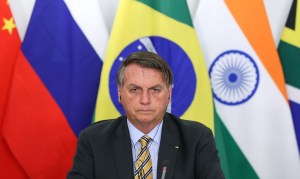
Addressing the BRICS leaders, Brazil’s President Jair Bolsonaro said that Brazil will disclose a list with the names of countries that import illegally extracted wood from the Brazilian Amazon, and rebutted the “attacks” the country has been dealt concerning wildfires and deforestation in the Amazon region. “I believe that, after the disclosure this practice will decrease considerably in this region.” he declared.
Brazilian Federal Police, he said, have developed a method to track the source of wood seized and exported using stable isotopes, which works like a DNA showing the geographical origin of products. “In the next few days, we’ll be revealing the names of the countries that import this illegal wood from the Amazon, because then we’ll be showing these countries—some of them rather critical of us—that they’re partly to blame for the advance of deforestation.
In terms of economic growth and dealing with Covid-19, Bolsonaro stated that “In 2020, the world once again faces a crisis with challenging outlines. Yet again, countries like the BRICS members may play a central role in the efforts to tackle COVID-19 and reinvigorate the economy,” he noted.
The path to economic growth, Bolsonaro argued, depends on cooperation focused on “mutual benefits and respect to national sovereignty,” with the expansion of measures to boost trade and the interaction of private sectors between member nations. “In this regard, BRICS has stood out for the variety of sectors and activities comprised by the group’s initiatives. Our cooperation should stimulate the freedom to create and undertake renewed trade.”
The president also advocated for an overhaul in international entities like the World Health Organization (WHO), the World Trade Organization (WTO), and the United Nations Security Council, the last made up of five permanent members (United States, Russia, China, France, and the United Kingdom), and ten non-permanent members, elected to two-year tenures.
In Bolsonaro’s opinion, a “truly integrated and active” international community is only possible if such revamping is carried out.
The president also criticized “the politicization of the Covid-19 virus and the alleged monopoly on WHO’s part,” and said that the pandemic showed “the centrality of nations for the solution of the problems assailing the world.”
“We all have to acknowledge the reality that it was not the international entities that have overcome the challenges, but rather the coordination among our countries,” he stressed, highlighting the need for an international system founded on freedom, transparency, and security, with the protection of democracy and the sovereignty of countries.
He also stated that the BRICS countries should spearhead the support for the reduction in subsidies for agricultural goods on WTO’s part and the permanent access of Brazil, India, and South Africa to the Security Council. “With this important step, I’m sure BRICS cooperation can be strengthened even further.” he stated.
Russian President Putin: Covid Vaccines
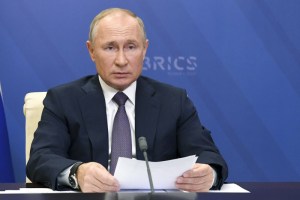
Russian President Vladimir Putin told BRICS leaders that coronavirus vaccines developed in Russia “work effectively and safely” and urged the group of emerging economy nations to “join forces” for the mass production of the shots. Putin stressed that “coordinating collective BRICS measures” to tackle the pandemic is the alliance’s priority. He also said Russia was ready to cooperate with its BRICS partners “in the manufacturing and use” of the Russian-made vaccines.
“There are Russian vaccines — they work effectively and safely,” Putin said. “It is very important to join forces for the mass production of these products for wide circulation.” The president noted that two different vaccines have been approved in Russia, and a third one was “in the works.”
The Russian Direct Investment Fund, which bankrolled the development of Sputnik V, has agreements with India and Brazil to conduct trials of the jab, and with pharmaceutical companies in India and China to produce it, Putin said.
“I think this is very important,” the Russian president added. Putin noted that Russia has agreements in place with India and Brazil to conduct clinical trials of its Sputnik V coronavirus vaccine, as well as manufacturing agreements with China and India. The world’s largest vaccine producer is in India, the Serum Institute of India.
The Russian leader did not offer specifics as to what broader efforts between the five countries to mass produce the vaccines would entail, or outline the commercial conditions, although he has previously said it would be ‘affordable’ at rates of about US$10 – compared with Western vaccines that are modelled on a profitability basis and thought to be 5-10 times more expensive.
Russia has registered two coronavirus vaccines as a global race heats up in producing an effective vaccine to combat the pandemic, which has now claimed the lives of 1.3 million people. In August, Russia announced that it had registered the world’s first Covid-19 vaccine, Sputnik V — named after the Soviet-era satellite — but did so ahead of large-scale clinical trials. Last month, Putin announced that Russia had registered a second coronavirus vaccine, EpiVacCorona. Russia has applied to the World Health Organization for accelerated registration and pre-qualification of the Sputnik V vaccine, which Russia has said is 92% effective.
Indian Prime Minister Modi: Covid, Terrorism
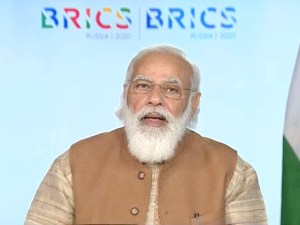
Prime Minister Narendra Modi stated confidence in India’s vaccine production and delivery capabilities in the fight against the Covid-19 pandemic and linked this to the National ‘Self Reliant’ and ‘Make In India’ campaigns. “We have started a comprehensive reform process under the ‘Self-reliant India’ campaign. The campaign is based on the belief that a self-reliant and resilient India post-Covid can be a force multiplier for the global economy and make a strong contribution to the global value chains. We also saw an example during Covid, when we were able to send essential medicines to more than 150 countries due to the capability of the Indian pharma industry. Our vaccine production and delivery capacity will also work in the interest of humanity like this.”
He underlined that BRICS economies will play a crucial role in the global recovery after the pandemic. “We have more than 42 per cent of the world’s population, and our countries are among the main engines of the global economy. There is a lot of scope for increasing mutual trade between BRICS countries. Our mutual institutions and systems—such as BRICS Inter-Bank Cooperation Mechanism, New Development Bank, Contingent Reserve Arrangement and Customs Cooperation—can also make our contribution effective in the global recovery,” he said. Modi also identified terrorism as the “biggest problem” facing the world and asserted that there was a need to tackle the menace in an organized manner. “Terrorism is the biggest problem the world is facing. We have to ensure that the countries that support and assist the terrorists are also held guilty,” PM Modi said. Although Modi did not name any country, his reference is seen as directed at Pakistan. In his address, PM Modi also underlined the need for reform of the United Nations Security Council as well as multilateral bodies like the World Trade Organisation and the International Monetary Fund.
Notably, this is the second time that PM Modi and Chinese President Xi Jinping shared a virtual platform this month. Earlier, both leaders had exchanged views at the Shanghai Cooperation Organisation (SCO) summit, where Modi had said that all member nations of the SCO should respect each others’ sovereignty and territorial integrity. Indian and Chinese soldiers have been in a border standoff in eastern Ladakh for the last six months.
Chinese President Xi: Covid, Traditional Chinese Medicine, Climate Change
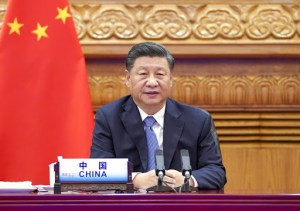
President Xi’s speech in full is as follows:
“Right now, the world is caught between a pandemic of the century and momentous changes never seen in the last one hundred years. The international landscape keeps evolving in profound ways. At such a critical moment, we are meeting to discuss our joint response to COVID-19 and draw a blueprint for the future of BRICS. The meeting has thus taken on a special significance.
Around the world, COVID-19 is posing a grave threat to people’s life and well-being. The global public health system is facing a severe test. Human society is going through the most serious pandemic in the past century. International trade and investment have shrunk considerably. The flow of goods and personnel has been impeded. Factors for uncertainty and instability are numerous. The world economy is witnessing the worst recession since the Great Depression in the 1930s. Unilateralism, protectionism and acts of bullying are becoming rampant, and the deficit in governance, trust, development and peace is widening instead of narrowing.
Despite all this, we remain convinced that the theme of our times, peace and development, has not changed, and that the trend toward multipolarity and economic globalization cannot be turned around. We must keep people’s welfare close to heart and pursue the vision of a community with a shared future for mankind. Through concrete actions, we will contribute our share to making the world a better place for everyone.
First, we need to uphold multilateralism, and safeguard peace and stability in our world. History teaches us that multilateralism, equity and justice can keep war and conflict at bay, while unilateralism and power politics will inflate dispute and confrontation. Flouting rules and laws, treading the path of unilateralism and bullying, and withdrawing from international organizations and agreements run counter to the will of the general public and trample on the legitimate rights and dignity of all nations.
Facing the choice between multilateralism and unilateralism, and between justice and hegemony, we BRICS countries must stand up for equity and justice in the world. We must hold high the banner of multilateralism, and defend the purposes and principles of the Charter of the United Nations. We must endeavor to safeguard the UN-centered international system and the international order underpinned by international law. It is important that countries rise above ideology and respect each other’s choices of social system, economic model and development path consistent with their national conditions. We need to champion the concept of common, comprehensive, cooperative and sustainable security. We need to work through consultation and negotiation to address differences. We need to oppose interference in others’ internal affairs, as well as unilateral sanctions and long-arm jurisdiction. With concerted efforts, we will foster a peaceful and stable environment for development.
Second, we need to enhance solidarity and coordination, and come together to meet the COVID-19 challenge. The coronavirus is still causing havoc in many places and waves of infection are resurging. Securing a worldwide victory against the pandemic remains an uphill journey. Nearly one year into the battle, many countries have gained important experience on COVID-19 containment and made encouraging progress in drugs and vaccine research and development (R&D). Our fight over the past year proves that as long as we stand in unity and follow science, we can control the spread of the virus and offset its impact.
What is important is that we put people’s life and health first, mobilize all resources and do everything we can to protect people’s safety and well-being. It is important to step up international coordination and response, and share information and epidemic control experience to stop the virus in its tracks. It is important that we support WHO’s crucial leadership role in this endeavor. As we speak, Chinese companies are working with their Russian and Brazilian partners on phase-III clinical trials of vaccines, and we are prepared to have cooperation with South Africa and India as well. China has joined the COVAX facility, a platform on which we will share vaccines with other countries, developing countries in particular. We will actively consider providing vaccines to BRICS countries where there is a need. To support the development of the BRICS Vaccine R&D Center, China has designated its own national center. We will work with other BRICS countries both online and offline to advance collective vaccine research and trials, set up plants, authorize production and recognize each other’s standards. I propose that we convene a BRICS symposium on traditional medicine to explore its role in coronavirus prevention and treatment. This may well boost the global arsenal against COVID-19.
What has happened shows that acts of politicization, stigmatization, blame-shifting and scapegoating only serve to disrupt overall global cooperation against the virus. We need to overcome division with unity, replace bias with reason and stamp out the “political virus”. In this way, we will pool the maximum global synergy to beat the virus.
Third, we need to pursue openness and innovation, and promote global economic recovery. The IMF predicts that the world economy will shrink by 4.4 percent this year, and that emerging markets and developing countries will experience negative growth for the first time in 60 years. To stabilize the economy while controlling the pandemic is the pressing task facing all countries. Under the precondition that safety is ensured, we must actively pursue economic recovery and seek to carry out economic and social activities in an orderly way as we fight the virus on an ongoing basis. We need to strengthen macroeconomic policy coordination, follow through on the initiative on facilitating cross-border flow of people and goods, and keep industrial and supply chains safe and open to better enable the resumption of business activities and economic recovery.
The practice of using the pandemic to pursue “de-globalization” or clamor for “economic decoupling” and “parallel systems” will end up hurting one’s own interests and the common interests of all. Under the current situation, we need to stand firm for building an open world economy. We need to uphold the multilateral trading system with the WTO at its core and reject abuse of the “national security” concept for protectionist purposes. We need to leverage the new business forms and models triggered by the pandemic, strengthen cooperation on scientific and technological innovation, and nurture an open, fair, equitable and nondiscriminatory business environment to bring about common development of higher quality and stronger resilience.
China will work with other parties to flesh out the BRICS Partnership on New Industrial Revolution at a faster pace. We will open in Xiamen, Fujian Province a BRICS Partnership on New Industrial Revolution innovation center to advance cooperation on policy coordination, personnel training and project development, and we welcome the active participation of fellow BRICS countries. Not long ago, China launched a Global Initiative on Data Security, which aims to jointly foster a peaceful, secure, open, cooperative and orderly cyberspace to enable sound growth of the digital economy. We look forward to support from our fellow BRICS countries.
Fourth, we need to prioritize people’s livelihood, and promote sustainable global development. Development holds the master key to all problems. All our efforts, from clearing the impact of COVID-19 and getting back to a normal life, to ending conflicts and humanitarian crises, ultimately depend on people-centered development. According to World Bank forecast, global per capita income might drop 3.6 percent this year, and some 88 million to 115 million people might be pushed into extreme poverty due to the pandemic.
COVID-19 is a challenge we have to face head-on. We need to call on the international community to place the implementation of the 2030 Agenda for Sustainable Development at the heart of international development cooperation. Poverty eradication must be made a primary goal, and more resources must be channeled to poverty reduction, education, health and infrastructure development. We need to support the UN’s coordinating role and foster global development partnerships that are more equal and balanced, so that the fruits of development will spread to more developing countries and the needs of underprivileged groups will be better addressed.
Fifth, we need to pursue green and low-carbon development, and strive for harmony between man and nature. Global warming will not stop due to COVID-19. To tackle climate change, we must never relax our efforts. We need to implement the Paris Agreement in good faith, stick to the principle of common but differentiated responsibilities, and provide more help to developing countries, particularly the small island developing states. China is prepared to take on international responsibilities befitting its level of development, and will continue to make extraordinary efforts to address climate change. Recently, I announced at the UN China’s initiative to scale up its nationally determined contributions and adopt more forceful policies and measures to strive to peak carbon dioxide emissions by 2030 and achieve carbon neutrality by 2060. You can count on China to keep its promise.
The recently concluded Fifth Plenary Session of the 19th CPC Central Committee adopted recommendations for formulating China’s 14th five-year plan. The plenum underscored that China will finish building a moderately prosperous society in all respects within the set time frame, and will embark on a new journey next year toward fully building a modern socialist country. Based on a scientific analysis of the new stage of China’s development, we will stay committed to the new development philosophy, and actively foster a new development paradigm with domestic circulation as the mainstay and domestic and international circulations reinforcing each other. We will redouble efforts to expand domestic demand, deepen reform across the board and promote innovation in science and technology to add impetus to China’s economic growth. China will not shut its door of opening-up; it will embrace the world with more open arms. China will be more vigorous in integrating with the global market and will take greater initiative in deepening international cooperation. In so doing, China will create more opportunities and space for global recovery and growth.
All of us are indeed passengers in the same boat. When the wind is strong and the tides are high, we must be even more focused on our direction. We must keep pace and work as a team to break the waves and navigate steadily toward a brighter future.”
South African President Ramaphosa: Covid, A ‘New Global Deal’, New Development Bank
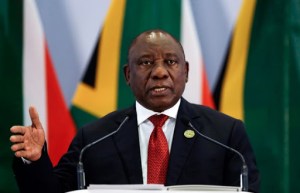
President Ramaphosa’s full speech is as follows:
“We are meeting at a time of global crisis; a time that calls for cooperation and dialogue between the nations of the world. The COVID-19 pandemic has damaged economies and devastated livelihoods across the world.
The disease has put immense strain on public health systems, and significant resources have had to be redirected to containing the spread of the virus. Trade and investment has been disrupted, as has global supply and demand. For emerging economies already facing challenges of poverty, inequality and underdevelopment, the pandemic has taken an even greater toll.
As BRICS countries, we are called upon to unite, to demonstrate our collective will and to provide leadership. This pandemic has taught us the necessity of strengthening health systems and being prepared for future emergencies of this nature and scale. It has shown us the importance of investing in science, technology and innovation.
Above all, it has taught us that international solidarity must pave the way to stability, security and economic growth. In this regard, I wish to commend the Russian Federation for its leadership of BRICS during this challenging time.
As South Africa and the African continent more broadly, we are grateful for the solidarity we have received from our BRICS partners, both through bilateral assistance and support for our continental response. While African leaders acted swiftly to contain the disease, it will take a long time for our economies to recover.
We therefore endorse the call made by the UN Secretary-General António Guterres for a New Global Deal. This includes a more inclusive and balanced multilateral trading system, the reform of debt architecture and greater access to affordable credit for developing countries.
In the spirit of this New Global Deal we call on the international community and our BRICS partners to support a comprehensive stimulus package for African countries. This will enable African countries to contain the disease and rebuild our damaged economies.
The New Development Bank has a significant role to play. To date, the Bank has approved $4 billion of COVID-related emergency assistance projects, including $1 billion to South Africa to support our health response and social relief measures. We welcome the indications from the New Development Bank that it aims to provide up to $10 billion in crisis-related assistance and to support economic recovery efforts.
We further welcome the commitment by our Health Ministers to promote access to affordable, quality medicines and to make diagnostic tools available within BRICS countries. South Africa is participating in several research initiatives with continental and international partners, including the global effort to develop, manufacture and distribute a COVID-19 vaccine. The current experience demonstrates the need to accelerate the establishment of the BRICS Vaccine Research and Development Centre in South Africa, as agreed in the 2018 Johannesburg Declaration.
We support the initiative to establish an integrated early warning System for preventing mass infectious diseases, and believe this is a project that could be supported by the New Development Bank. Investing in science, technology and innovation will not only prepare us for future health emergencies, but it will also enable us to confront other global challenges.
Our ministries responsible for science and their funding agencies should be commended for the speed and efficiency with which they mobilised the capacities of our BRICS Science, Technology and Innovation Framework Programme in their response to COVID-19. We should step up cooperation in this area to support the recovery effort.
Since restoring our economies to good health is a goal common to us all, it is timely that we are undertaking a review of the BRICS Strategy for Economic Partnership 2025. We remain committed to achieving sustainable development in BRICS and to the creation of opportunities for all. To fast-track our economic recovery, trade and investment ties between BRICS countries must be strengthened.
The pandemic has exposed the vulnerability of an over dependence on fragile global supply chains even for basic foods and essential medical products. As African countries it has shown us the need to build more resilient national and regional supply-chains to enable the continent to respond more effectively to such crises in future. This week South Africa will host its third Investment Conference.
It is a platform to share with investors the progress we have made in economic reforms and to showcase our country’s potential as an investment destination. A central pillar of our national recovery is to diversify and upgrade our industrial capacity, supporting the wider processes of industrialisation across Africa. We call on our BRICS partners to ramp up investment in not just South Africa but across the continent, particularly in the manufacturing sector. Investors from the BRIC countries will realise considerable benefits by investing in Africa, particularly with the implementation of the African Continental Free Trade Area from January 2021.
It is clear from this pandemic, that we must strengthen multilateralism as the preferred means to advance our mutual interests. We reiterate our call for reform of the UN Security Council to ensure that it is more representative and inclusive, in line with the principle of the sovereign equality of all states.
We need to ensure that trade rules take the interests of developing countries into account, particularly with respect to development through industrialisation. Reform of the World Trade Organisation is therefore key to rebalancing the global trading system and ensuring that its benefits are shared more equitably.
As we resolved in the 2019 Brasilia Declaration, we must continue to collaborate through the BRICS partnership to address the problem of under-invoicing, which has a profound impact on our industrial development and employment goals.
Since its founding, BRICS has stood as a testament to the power of solidarity. Our meeting today – in the midst of economic and social turmoil – is evidence that our partnership is strong and enduring. Working together, let us continue our onward march towards shared peace, security and prosperity, not only for our respective countries, but for all of humanity.”
Summary
The main feature of the BRICS 2020 summit was dealing with the Covid-19 pandemic and liaising between the countries concerned about vaccine production and distribution. It is apparent that each specific BRICS nation have roles to play in this, from vaccine development, testing, to manufacture and distribution in their respective regions.
Following the BRICS summit, both Brazil and South Africa have called for countries to waive patent fees for Covid-19 vaccines and sent a proposal to the WTO for consideration. This is likely to face opposition from the United States and EU whose Governments have spend billions on grants to their domestic pharmaceutical companies to develop such drugs.
Above this, a general unhappiness with the existing status of the current World Order has been manifest and calls for shakeups at the UN Security Council, World Bank, and World Health Organisation are only going to increase in the wake of any lack of global leadership or coordination during the Covid pandemic. The BRICS nations are sufficiently spread apart globally, as well as powerful enough to instigate developments and supply chains. How they coordinate and what they learn through such interaction is going to support supply chains in other areas, such as trade, for years to come. The trade impact of the BRICS nations working together in research, production and distribution will have profound consequences in later trade patterns.
Following the BRICS summit, a ‘Moscow Declaration’ was issued. That can be downloaded here.
Related Reading
- The BRICS Nations Are Headed For 50% Of Global GDP By 2030. This Is What It Could Mean For Developing Global Supply Chains & Emerging Consumer Markets.
- The Shanghai Cooperation Organisation November 2020 Summit Overview
- 15th East Asia Ministerial Summit, November 2020 – Review
About Us
Silk Road Briefing is written by Dezan Shira & Associates. The firm has 28 offices throughout Asia, and assists foreign investors into the region. For strategic advisory and business intelligence issues please contact the firm at silkroad@dezshira.com or visit www.dezshira.com





